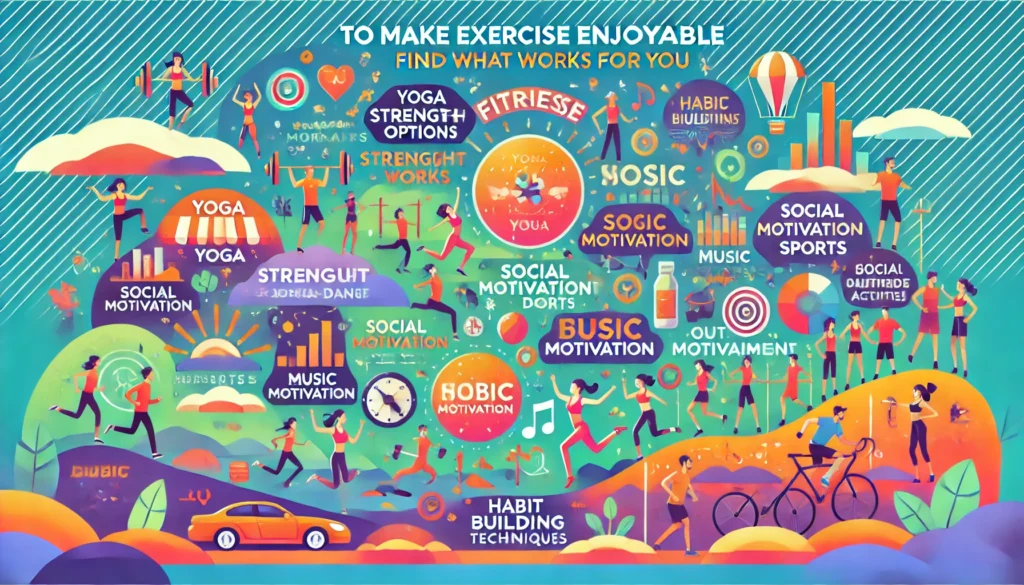We have all been there. Signing up for a gym membership or starting a new workout plan, only to lose motivation after a few weeks. Life gets busy, progress feels slow, and workouts start feeling like a chore.
But here is the thing. Motivation is not just about willpower. It is about having the right mindset, tools, and strategies to keep you going.
Whether you are just beginning or have hit a plateau, staying motivated in your fitness journey requires a mix of realistic goals, enjoyable workouts, and social support to keep you engaged.
In this guide, we will dive into practical ways to stay motivated, including:
- How to set realistic goals that keep you moving forward
- How to make workouts fun so they feel less like a chore
- How to use social motivation and accountability to stay consistent
By the end, you will have a game plan to stay focused, build momentum, and make fitness a sustainable part of your life.
Set Realistic Goals to Build Long-Term Motivation

Why Goals Matter
One of the biggest reasons people lose motivation is setting goals that are too extreme or too vague. If you expect to lose weight overnight or gain a six-pack in a month, frustration will set in fast. The key is to focus on long-term progress, not quick fixes.
How to Set Goals That Stick
Ever felt discouraged because you were not seeing results fast enough? That is a sign your fitness goals might need a reset. The key to staying motivated is setting realistic goals that keep you excited, not overwhelmed.
Think of fitness as a long-term commitment, not a quick fix. Set goals that push you forward but are still achievable. Instead of saying, “I want to lose 20 pounds in a month,” shift to, “I will focus on improving my fitness routine and increasing my physical activity three times a week.” This approach ensures you are building habits that stick.
And do not forget to celebrate progress along the way. Whether it is lifting heavier weights, running longer, or simply feeling more energy, every win counts.
Use the SMART Goal Framework
For better results, set SMART goals:
- Specific: Clearly define what you want to achieve (e.g., run a 5K in eight weeks).
- Measurable: Track progress (e.g., increase weights by five pounds every two weeks).
- Achievable: Keep goals within reach to avoid burnout.
- Relevant: Align goals with your fitness journey.
- Time-bound: Set deadlines to stay on track.
By setting and adjusting your goals, you will keep the excitement alive and stay motivated for the long haul.
Make Exercise Enjoyable: Find What Works for You
Why Fun Matters
If your workouts feel like a boring obligation, motivation will disappear fast. The secret is to find activities that you enjoy.
Sticking to an exercise routine is much easier when you actually enjoy it. If you hate running, do not force yourself onto a treadmill. Find something that excites you.
How to Make Fitness Fun

Love music? Try dance classes or cardiovascular exercises like Zumba. Prefer structure? Join fitness classes or work with a personal trainer. If you love the outdoors, hiking or cycling might be perfect for you.
The key is to match your workouts with your personality and lifestyle. When fitness feels less like a chore and more like something you look forward to, staying motivated becomes effortless.
Experiment With Different Workouts
- Try new fitness classes like boxing, HIIT, and yoga
- Mix things up by alternating between strength training, cardio, and flexibility workouts
- Listen to your mood. Low energy? Try walking or stretching. Need a challenge? Go for weightlifting
The more variety you add, the less likely you will feel bored, and the easier it will be to stay motivated over time.
Overcoming Gym Intimidation and Workout Anxiety
Why People Avoid the Gym
Many people feel uncomfortable or overwhelmed in a gym setting. Fear of judgment, uncertainty about how to use equipment, or feeling out of place can make it hard to stay motivated.
This is a common barrier, but it should not stop you from reaching your fitness goals. The gym is a place for everyone, regardless of experience level. Learning how to navigate the environment and build confidence will help make workouts feel more natural and enjoyable.
How to Feel Confident at the Gym
- Work with a personal trainer to learn proper form and techniques. A few guided sessions can make a big difference. The American Council on Exercise (ACE) explains how trainers can help beginners get comfortable in the gym (source).
- Have a workout plan before you go. Knowing exactly what exercises to do will help you avoid wandering around unsure of where to start. Websites like Bodybuilding.com offer free workout plans tailored to different fitness levels (source).
- Pick off-peak hours if you feel overwhelmed by large crowds. Gyms tend to be quieter in the late morning or early afternoon.
- Focus on your progress rather than comparing yourself to others. Everyone starts somewhere, and every workout is a step forward.
If the gym is not the right fit for you, consider at-home workouts or outdoor fitness options. The most important thing is to stay consistent and comfortable in your routine.
Accountability and Social Motivation: The Power of Community
Why Accountability Works
Staying motivated is easier when you are not doing it alone. Having a support system, whether it is a workout partner, a personal trainer, or a fitness community, can help keep you on track.
Research shows that people who exercise with others are more likely to maintain their fitness routine. The added encouragement and shared commitment make workouts feel more enjoyable and less like an obligation.
Find Your Support System
Staying motivated is easier when you are not doing it alone. Having a support system, whether it is a personal trainer, workout buddy, or fitness community, can make all the difference.
Studies show that people who exercise with others are more likely to stick to their fitness routine. Whether it is a friend who joins you at the gym, a virtual accountability group, or a local fitness class, surrounding yourself with like-minded people keeps you engaged and motivated.
Not a fan of group workouts? No problem. Even tracking your progress in a journal or using an app can give you a sense of accountability. The key is to stay connected because motivation grows when shared.
Ways to Stay Accountable
- Join a fitness community, online or in person. Many local gyms and studios offer group workouts that help build a sense of belonging.
- Find a workout partner to add an extra level of commitment. Knowing someone is counting on you can help keep you motivated.
- Use fitness apps to track workouts, set reminders, and monitor progress. Seeing improvement over time reinforces motivation.
Building accountability into your fitness journey makes it easier to stay consistent, push past obstacles, and celebrate progress.
Adjusting Your Routine to Avoid Boredom and Burnout

Why People Quit
Many people start their fitness journey with enthusiasm, but over time, workouts can feel repetitive or exhausting. This can lead to boredom, frustration, and eventually giving up altogether. The key to long-term success is learning how to adjust your routine before burnout sets in.
Two common reasons people lose motivation are:
- Monotony – Doing the same workouts every week can become dull.
- Overtraining – Pushing too hard without enough recovery can leave you feeling exhausted and unmotivated.
How to Prevent Burnout
Making small changes to your routine can keep workouts engaging and sustainable.
- Try new workout styles to challenge your body in different ways. If you usually run, try strength training or a dance class. Adding variety helps prevent both boredom and fitness plateaus.
- Change your workout environment to make exercise feel fresh. Training outdoors, using new equipment, or joining a different fitness class can make a big difference.
- Incorporate rest and recovery into your schedule. Overtraining can lead to fatigue and injuries, which may make you want to quit altogether. The National Academy of Sports Medicine (NASM) emphasizes the importance of rest days for long-term progress (source).
- Set short-term challenges to stay engaged. Trying to improve your mile time, lift heavier weights, or complete a 30-day challenge can help you stay focused.
Staying motivated is not about constantly pushing yourself harder. It is about finding ways to keep your routine enjoyable, flexible, and balanced.
Keep Moving Forward: Your Fitness Journey Continues
Staying motivated in your fitness journey is not about relying on willpower alone. It is about creating a system that keeps you engaged, inspired, and progressing toward your goals. Setting realistic goals ensures that you are challenging yourself without feeling overwhelmed.
Finding workouts you enjoy makes exercise feel like a choice rather than an obligation. Using social motivation and accountability helps you stay committed, while adjusting your routine when needed prevents boredom and burnout.
Staying motivated is about building habits, not chasing perfection. Some days will be easier than others, but consistency is what leads to lasting results.
Whether it is a short walk, a new fitness class, or a simple stretch session, take the first step today. Your future self will thank you. For more expert tips and guidance on staying motivated, visit IAC Fitness and start making fitness a lifelong commitment.

